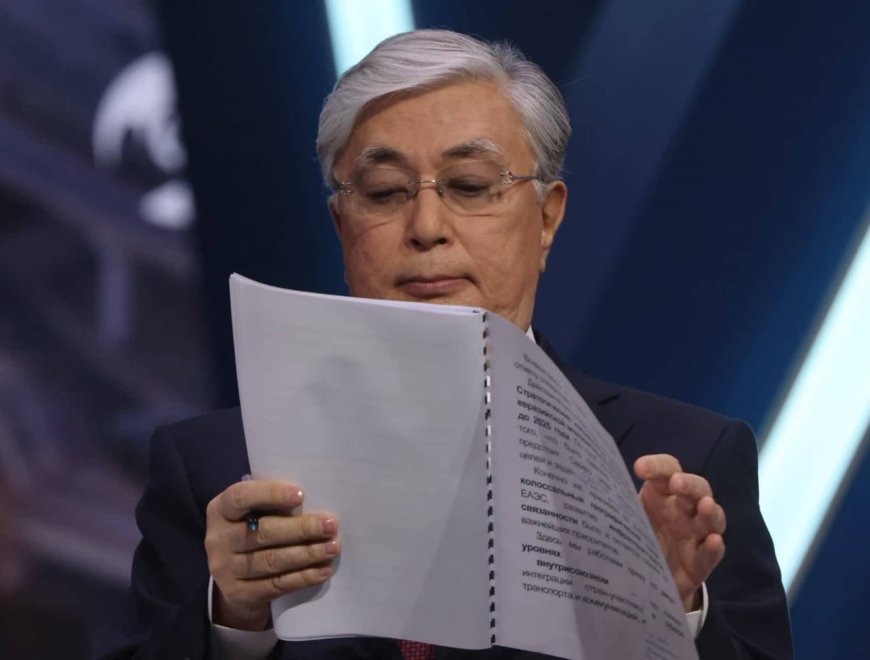Kazakhstan's Geopolitical Conundrum: Caught Between Russia and the West

Central Asian countries find themselves teetering on the precipice of the geopolitical abyss, caught between the competing interests of global powers. The intricate dance of diplomacy they must perform requires a deft touch to maintain relations with Russia while also appeasing the demands of the West, particularly in light of sanctions against Russia. Among these nations, Kazakhstan emerges as a standout performer, deftly managing this delicate equilibrium with a poise that eludes its regional counterparts.
In recent months, leaders in Kazakhstan and Kyrgyzstan have resorted to grand gestures and carefully crafted rhetoric in a bid to navigate the complex web of relationships entangled in the conflict in Ukraine. President Kassym-Jomart Tokayev of Kazakhstan, for instance, reiterated his country's commitment to abiding by sanctions against Russia during a high-profile visit to Germany. Despite denials of facilitating sanctions evasion, Tokayev underscored Kazakhstan's adherence to the sanctions regime while emphasizing the value of robust cooperation with Russia, its neighbor with the longest shared border.
Similarly, Kyrgyzstan's President, Sadyr Japarov, has vehemently refuted accusations of violating sanctions imposed by the United States, asserting that his nation's actions do not pose a threat to the economic interests of Russia and China. However, this nuanced approach may prove insufficient for shielding Central Asian countries from the repercussions of their geopolitical tightrope walk.
The repercussions of this diplomatic balancing act are already manifesting, with Kyrgyz companies facing sanctions for allegedly circumventing restrictions against Russia. In contrast, Kazakhstan's strategic importance to Europe and America has positioned it as a valuable ally in the eyes of the West, leading to a certain degree of appeasement to safeguard this crucial partnership.
President Tokayev's astute maneuvering has allowed Kazakhstan to present a favorable image to Western audiences, shielding the nation from potential external pressures. By engaging with Western media outlets and think tanks, Kazakhstan has cultivated a positive narrative that resonates with international observers, further solidifying its position on the global stage.
Yet, beneath the veneer of diplomatic finesse lies a fundamental question: can Kazakhstan sustain its delicate balancing act in the face of mounting pressures and threats? The conundrum of aligning with the West while maintaining stable relations with Russia presents a formidable challenge that demands resolution. As tensions simmer in Ukraine, Kazakhstan finds itself at a crossroads, compelled to make a strategic choice that will shape its future trajectory.
The intricate interplay of economic interests further complicates Kazakhstan's geopolitical calculus. Endowed with abundant oil and gas reserves, Kazakhstan holds a pivotal role in ensuring global energy security, a factor that garners support from Western powers keen on maintaining stability in the energy market. Additionally, the presence of Western energy investments underscores the multifaceted nature of the West's stakes in Kazakhstan, underscoring the complexity of the nation's geopolitical landscape.
As Kazakhstan grapples with the pressing need to define its stance amidst shifting global dynamics, President Tokayev faces the daunting task of charting a course that safeguards the nation's interests while navigating the treacherous waters of international politics. The specter of conflict looms large, casting a shadow of uncertainty over Kazakhstan's future trajectory. In this delicate geopolitical dance, the stakes are high and the margin for error is slim.
Only time will tell whether Kazakhstan can maintain its delicate equilibrium or if the forces of geopolitics will compel it to choose sides. In a world rife with uncertainty, Kazakhstan stands at a crossroads, poised to determine its destiny amidst the tumult of global power dynamics. As President Tokayev steers the nation through turbulent waters, the eyes of the world remain fixed on Central Asia, where the intricate tapestry of geopolitics continues to unfold with profound implications for the region and beyond.













































